World condemns Myanmar junta for execution of activists
August 1, 2022 · By UCA News Network for www.ucanews.com
World condemns Myanmar junta for execution of activists
The execution of four political prisoners by Myanmar military junta has triggered a global outrage. The prisoners included Phyo Zeya Thaw, a former lawmaker from Aung San Suu Kyi’s National League for Democracy, and prominent democracy activist Kyaw Min Yu, known as Jimmy.
State media reported on Monday that executions of the prisoners were carried out in Insein Prison of Yangon. A military tribunal sentenced them to death in January and their appeals were later dismissed. The executions were the first in the conflict-ridden country in more than three decades.
The United Nations Security Council has slammed the executions and called for immediate halt to violence and release of all political prisoners. The ASEAN Parliamentarians for Human Rights termed the executions as an “act of judicial barbarism.” The United States, the European Union, Britain, Australia, Canada, Japan, New Zealand, Norway and South Korea have also strongly denounced the executions.
Fear and anxiety are growing inside Myanmar as the junta could execute more political prisoners. Some 74 people in detention have been sentenced to death and a further 41 were handed death sentences in absentia, bringing the total to 115, according to the Assistance Association for Political Prisoners.
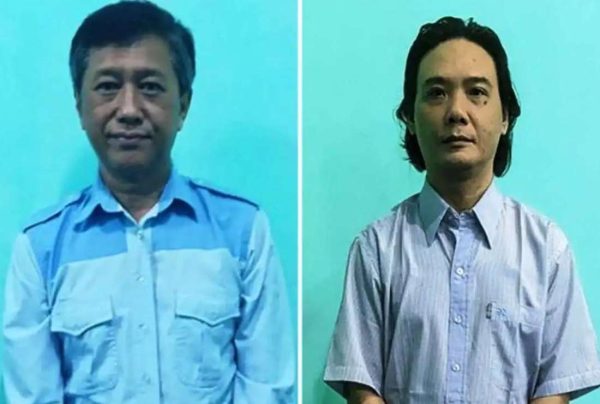
Democracy activist Kyaw Min Yu, also known as ‘Jimmy’ (left), and former lawmaker Maung Kyaw, who also goes by the name Phyo Zeya Thaw, in this undated handout photographs released by Myanmar’s Military Information Team on January 21. (Photo: AFP)
Church officials have made an urgent appeal for aid after a powerful earthquake hit northern Philippines, on Wednesday. The 7-magnitide quake left at least five dead, over 150 injured and damaged buildings including churches and historical sites in Arba province in the main island of Luzon.
Hospitals were forced to evacuate patients amid fears the buildings might collapse after developing cracks. The Archdiocese of Tuguegarao said churches and historical sites sustained cracks while church bells fell because of the tremor. The archdiocese appealed for assistance to affected communities facing hard times since the quake struck.
Government officials said the quake caused landslides, power interruptions and blocked roads in more than 10 cities and almost 300 towns in the region such the Ilocos and Mountain provinces.
Earthquakes hit Philippines frequently as the country sits on the Pacific “Ring of Fire,” an arc of intense seismic activity that stretches from Japan through Southeast Asia and across the Pacific basin. Officials say Wednesday’s quake was the strongest recorded in years.
An archbishop in the southern Indian state of Kerala has resigned following an order from the Vatican over his alleged defiance over implementing liturgical reforms approved by the synod of the Eastern-rite Syro-Malabar Church.
Archbishop Antony Kariyil, the vicar of the major archbishop of Ernakulam-Angamaly archdiocese, expressed his willingness to resign on Tuesday, six days after he was summoned to the Vatican nunciature in national capital New Delhi.
Officials in the archdiocese said that Apostolic nuncio Archbishop Leopoldo Girelli issued a letter asking him to resign. A group of priests held an emergency meeting to record their opposition to the action.
The resignation is the latest in the church’s long-running liturgical dispute. For over four decades the Church was divided on the issue of celebrating the Mass. One group wanted to celebrate Mass by turning to the altar in an effort to restore their ancient liturgy, while another group, led by the Ernakulam-Angamaly archdiocese, opposed it.
A Catholic priest in China has blamed the Communist Party for exploiting the China-Vatican agreement to launch a crackdown on Catholic clergy.
Father Dong Baolu, a priest from Zhengding diocese in Hebei province of northern China, said that as part of the ongoing crackdown, an underground church in Youtong village was demolished last month. The incident triggered dismay among hundreds of local Catholics who used the large tent for meetings and worship.
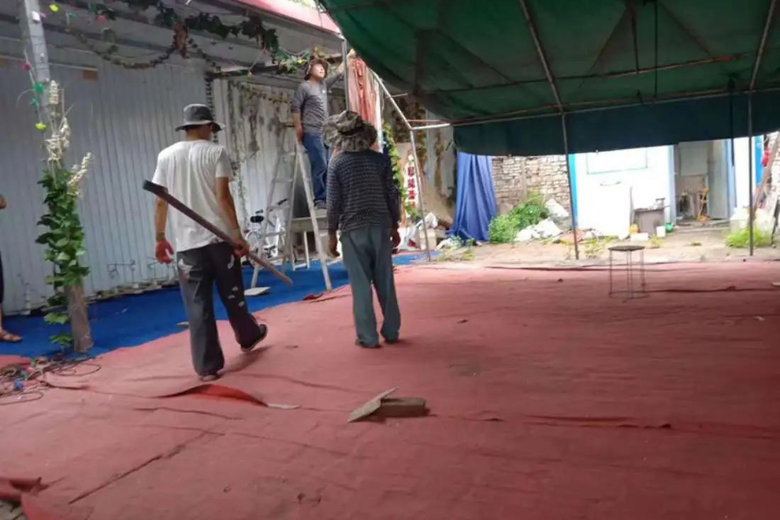
Workers demolish the underground Catholic church in Youtong village of Hebei province of China at the end of last month. (Photo: RFA)
The priest said the authorities hired workers to carry out the demolition after he refused to sign an agreement to join the state-sanctioned Chinese Catholic Patriotic Association. He noted that almost all clergy in the diocese have joined the official church.
Father Baolu noted that the crackdown to dismantle the underground church started after the Vatican signed a deal with China in 2018, which was renewed in 2020. The Vatican seeks to unite some 12 million Catholics divided between the state-sponsored church and the Vatican-aligned church. Critics say the deal gives China an opportunity to eliminate the independent church.
Christians in Indonesia’s Christian-majority province of East Nusa Tenggara have asked the government to take actions against a fast-spreading Islamic extremist group in the region.
Yohanis Fransiskus Lema, a Catholic lawmaker has warned that security agencies must take seriously the threat of the extremist group, the Khilafatul Muslimin, which aims to establish Islamic caliphate in Indonesia.
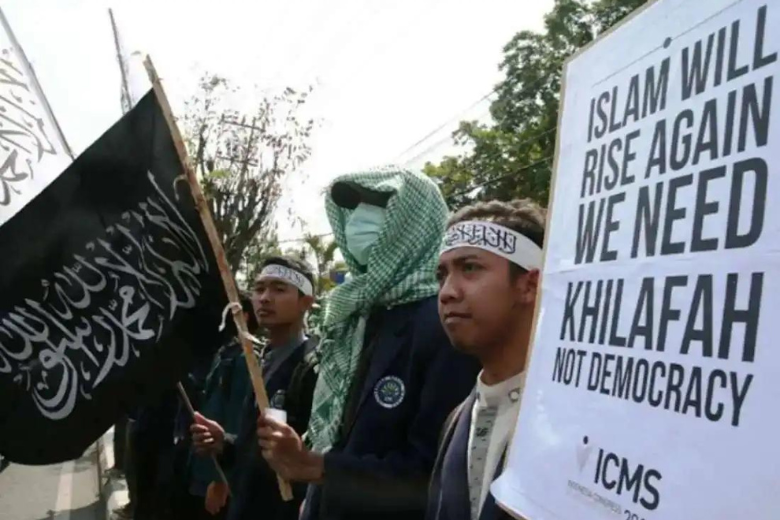
Members of hardline Islamic organization Hizbut Tahrir Indonesia hold a demonstration calling for the establishment of an Islamic caliphate during a rally in Malang on Java island in this file photo. (Photo: AFP)
He noted that the group’s ideology threatens national unity and tolerance in the country. Media reports suggested the extremist group has more than 100 members in the province and its cells are being expanded constantly.
Christians are concerned over recent arrests of several members of the outfit by special forces. Khilafatul Muslimin is said to be an offshoot of Hizbut-Tahrir Indonesia. The government banned it in 2017 after calling for an Islamic caliphate.
Catholic bishops in Sri Lanka have condemned security forces for the brutal assault on unarmed demonstrators and media persons while demolishing the main camp of anti-government protesters in capital Colombo, last Friday.
The military, police and special forces forcibly cleared the protest camp in front of the Presidential Palace following an order from the new president, Ranil Wickremesinghe.

Christian priests walk through the tents installed by the demonstrators near Presidential Secretariat in Colombo on July 24, 2022. (Photo: Arun Sankar/ AFP)
In a statement, Catholic bishops said the suppression of human rights “will further exacerbate mass unrest and damage the image of the country in the international community.” The bishops also urged the new president to safeguard the legitimate and democratic rights of every citizen enshrined in the constitution of the country.
The protest camp had served as the epicenter of the months-long nationwide protests that effectively ousted the Rajapaksa dynasty blamed for the worst economic crisis in Sri Lanka since its independence from Britain in 1948.
A Church official in Cambodia says the recent US report on human trafficking that placed the country among the worst performers in the world is “politically biased.”
Savong Duong, a member of the Interfaith Commission representing Cambodia’s Catholic community, said the report released last week ranked the country at the bottom, because US has an “anti-China policy” and considers Cambodia to be connected to China.
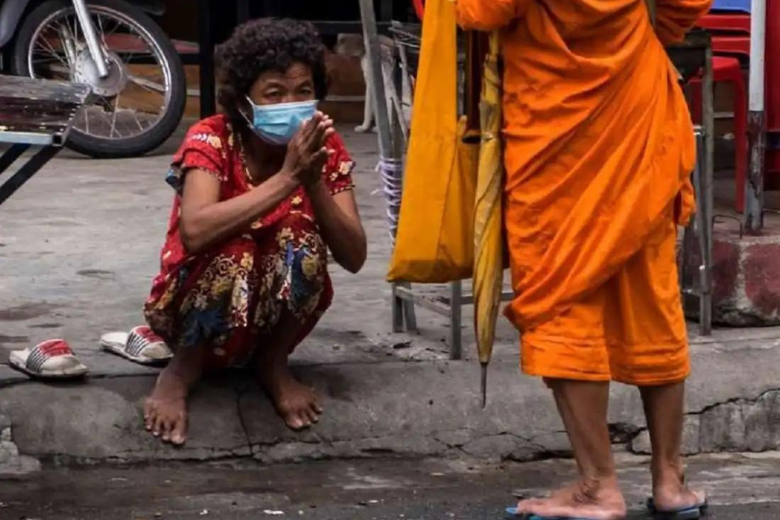
A woman prays before a monk in a Phnom Penh street. Rights groups say the economic crunch caused by Covid-19 has forced many Cambodians to chance their luck with human traffickers. (Photo: Luke Hunt/UCA News)
The US government’s 2022 Trafficking in Persons report downgraded Cambodia to Tier 3 status, listing it among countries with the worst record of human trafficking. It also accused the administration of corruption and an unwillingness to bring human traffickers before the law.
Cambodia is among 21 countries including China and Russia on the Tier 3 list. Other Asian nations on the worst performing list are Afghanistan, Brunei, Macau, Malaysia, Myanmar, North Korea and Vietnam.
Thousands of coastal villagers in southern Bangladesh are in dire straits as the government has banned access to the Sundarbans, the world’s largest mangrove forest, for three months citing protection of natural resources.
Local villagers said that the June-August ban deprives them of their livelihoods like fishing, catching crab and harvesting honey, without offering any compensation. Government officials admitted the ban spells hardships for local communities, but said they will eventually reap the benefits.
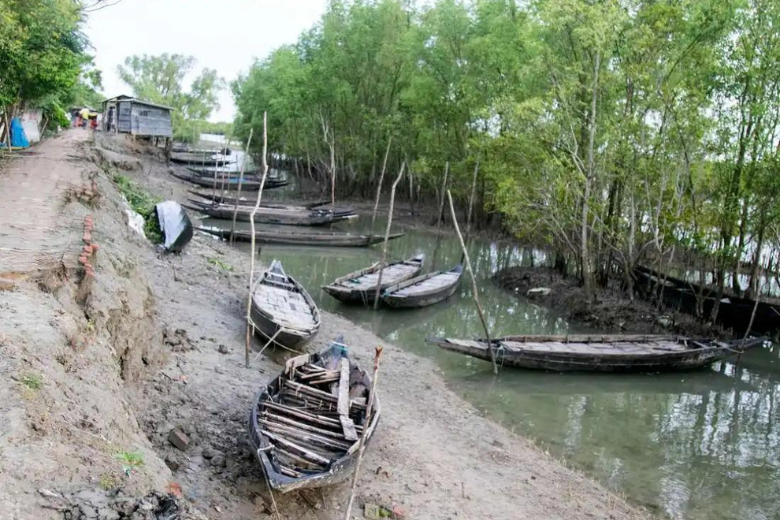
Fishing and other activities in the Sundarbans have been stopped from June to August. (Photo: Stephan Uttom/UCA News)
Sundarbans watershed is a treasure trove of aquatic life. There are 210 species of white fish, 24 species of shrimps and 14 species of crabs. Fish are born in the river channels of the Sundarbans during the breeding season from June to August.
At least 600,000 people directly or indirectly depend on it for a living. The government earns about 680,000 US dollars annually from the permits it issues to those who seek access to the Sundarbans for a livelihood.
A report from South Korea’s Meteorological Administration warned that the Korean Peninsula is bracing for severe forms of climate crisis amid natural disasters like rising temperatures, heavy rains, and wildfires.
In its 2021 climate analysis, the state agency indicated that the impact of daily life and industrial activities are gradually contributing to record-breaking heat waves. The average nationwide temperature was measured from 13.2 degrees to 24.7 degrees Celsius, the highest since 1973.

A scene from wildfires in Uljin and Samcheok of South Korea in March of this year. On the Korean peninsula, large-scale wildfires are frequently occurring due to climate change. (Photo: Gyeongsangbuk-do/Catholic Times)
With the current trend of greenhouse gas emission, Korea will see average annual temperature rise by 1.8 degrees Celsius.
Catholic groups and environmentalists have been calling on the government to change its environmental policy and strictly implement a carbon-neutrality law to reduce carbon emissions. In May, the groups conducted a 40-day nationwide tour to raise awareness about the environment.






